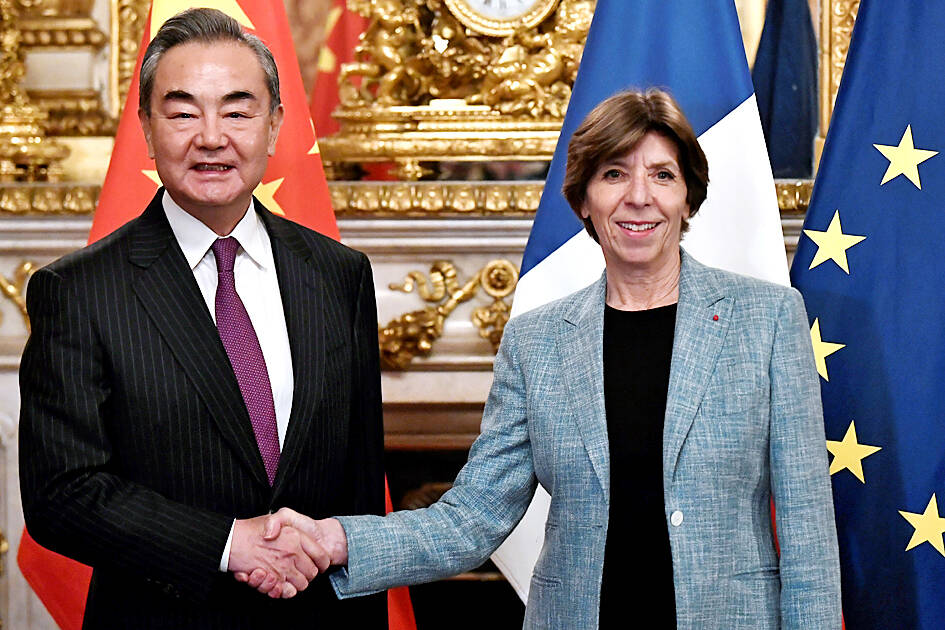China yesterday questioned whether the US genuinely seeks to repair ties damaged by a dispute over a spy balloon as the two nations’ top diplomats head to a security conference in Germany, where they might meet on the sidelines.
Chinese Central Foreign Affairs Commission Director Wang Yi (王毅) is to attend the conference as part of a visit to several European countries.
Starting his trip, he on Wednesday had talks with French President Emmanuel Macron about the war in Ukraine.

Photo: EPA-EFE
Macron’s office said that in a closed-doors meeting, they discussed the consequences of Russia’s invasion of Ukraine on the world’s most vulnerable nations regarding food security..
They expressed “the same objective of contributing to peace in line with international law,” it said.
Wang was yesterday scheduled to participate in a session of a French-Chinese strategic dialogue with Macron’s top diplomatic adviser to discuss bilateral projects.
In the coming days, Wang is to travel to Italy, Hungary, Russia and Germany.
He is expected to speak at the Munich Security Conference, which starts today.
Wang’s tour is seen as part of China’s efforts to restore ties with European nations at a time of rising tensions between the world’s two largest economies — China and the US — following the US military shooting down a suspected Chinese spy balloon earlier this month.
The trip comes amid China’s persistent efforts to push back against Western pressure on trade, technology, human rights and its claims to a broad swath of the western Pacific.
China’s refusal to condemn the invasion of Ukraine nearly a year ago, and join others in imposing sanctions on Russia as the war heads into a second year, has further frayed ties with the West and fueled an emerging divide with much of Europe.
In December last year, Wang defended what he said was his country’s position of impartiality on the war in Ukraine and signaled that China would deepen ties with Russia this year.
Speaking ahead of the trip, Chinese Ministry of Foreign Affairs spokesman Wang Wenbin (汪文斌) said Wang Yi would have “in-depth strategic communication” aiming to “promote new developments in bilateral relations, enhance strategic mutual trust between China and Europe, and exchange views on major international issues.”
In Munich, Wang Yi is expected to meet with US Secretary of State Antony Blinken.
Wang Wenbin yesterday said the balloon saga “tests the US’ sincerity and capability to properly handle crises and stabilize relations with China.”
The remarks came after Beijing rebuffed US attempts to arrange a telephone call between the two countries’ top defense officials.
The Pentagon asked for a call between US Secretary of Defense Lloyd Austin and Chinese Minister of National Defense General Wei Fenghe (魏鳳和) right after the balloon was shot down on Feb. 4, but China “declined our request,” Pentagon press secretary Brigadier General Pat Ryder said in a statement last week.
“The US cannot ask for communication and dialogue on the one hand while sharpening differences and escalating crises on the other,” Wang Wenbin said yesterday.

The Taiwanese passport ranked 33rd in a global listing of passports by convenience this month, rising three places from last month’s ranking, but matching its position in January last year. The Henley Passport Index, an international ranking of passports by the number of designations its holder can travel to without a visa, showed that the Taiwan passport enables holders to travel to 139 countries and territories without a visa. Singapore’s passport was ranked the most powerful with visa-free access to 192 destinations out of 227, according to the index published on Tuesday by UK-based migration investment consultancy firm Henley and Partners. Japan’s and

NATIONAL SECURITY THREAT: An official said that Guan Guan’s comments had gone beyond the threshold of free speech, as she advocated for the destruction of the ROC China-born media influencer Guan Guan’s (關關) residency permit has been revoked for repeatedly posting pro-China content that threatens national security, the National Immigration Agency said yesterday. Guan Guan has said many controversial things in her videos posted to Douyin (抖音), including “the red flag will soon be painted all over Taiwan” and “Taiwan is an inseparable part of China,” while expressing hope for expedited “reunification.” The agency received multiple reports alleging that Guan Guan had advocated for armed reunification last year. After investigating, the agency last month issued a notice requiring her to appear and account for her actions. Guan Guan appeared as required,

Japan and the Philippines yesterday signed a defense pact that would allow the tax-free provision of ammunition, fuel, food and other necessities when their forces stage joint training to boost deterrence against China’s growing aggression in the region and to bolster their preparation for natural disasters. Japan has faced increasing political, trade and security tensions with China, which was angered by Japanese Prime Minister Sanae Takaichi’s remark that a Chinese attack on Taiwan would be a survival-threatening situation for Japan, triggering a military response. Japan and the Philippines have also had separate territorial conflicts with Beijing in the East and South China

A strong cold air mass is expected to arrive tonight, bringing a change in weather and a drop in temperature, the Central Weather Administration (CWA) said. The coldest time would be early on Thursday morning, with temperatures in some areas dipping as low as 8°C, it said. Daytime highs yesterday were 22°C to 24°C in northern and eastern Taiwan, and about 25°C to 28°C in the central and southern regions, it said. However, nighttime lows would dip to about 15°C to 16°C in central and northern Taiwan as well as the northeast, and 17°C to 19°C elsewhere, it said. Tropical Storm Nokaen, currently